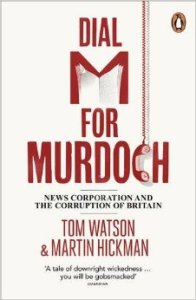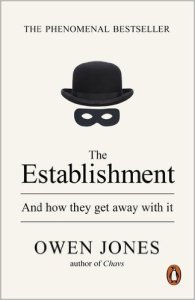 ‘Dial M for Murdoch: News Corporation and the Corruption of Britain’ by Tom Watson and Martin Hickman explores the background of the phone hacking scandal which engulfed Rupert Murdoch’s media empire News International. It was revealed in 2011 that messages on a mobile phone belonging to murdered teenager Milly Dowler had been hacked by journalists working for the News of the World, a former tabloid newspaper. The organisation initially used a “rogue reporter” defence but further evidence exposed how the practice had been carried out extensively for several years under the watch of several senior editors. This subsequently led to a complex investigation and public inquiry which implicated politicians and the police as much as the press.
‘Dial M for Murdoch: News Corporation and the Corruption of Britain’ by Tom Watson and Martin Hickman explores the background of the phone hacking scandal which engulfed Rupert Murdoch’s media empire News International. It was revealed in 2011 that messages on a mobile phone belonging to murdered teenager Milly Dowler had been hacked by journalists working for the News of the World, a former tabloid newspaper. The organisation initially used a “rogue reporter” defence but further evidence exposed how the practice had been carried out extensively for several years under the watch of several senior editors. This subsequently led to a complex investigation and public inquiry which implicated politicians and the police as much as the press.
I read an updated paperback edition of ‘Dial M for Murdoch’ published in 2012, the back cover of which states that it has yet to be reviewed in The Times, Sunday Times, Sun or Sun on Sunday along with a telling quote from Rupert Murdoch himself: “I’m not planning on reading it”. Indeed, the very existence of ‘Dial M for Murdoch’ was only announced by Penguin three days before it was published to prevent News International from attempting to block the book’s launch.
Tom Watson is a Labour Party MP for West Bromwich East and was a member of the Culture, Media and Sport Select Committee at the time the saga first came to the attention of the wider public while Martin Hickman is a journalist at the Independent. Having both had first-hand encounters with some of those involved, Watson and Hickman refer to themselves in the third person throughout the book which is a little odd to read at times. However, they chose to do this for the right reasons as they explained in the introduction written in the first person that “we didn’t want to overemphasize our roles”. The narrative has been skilfully constructed like a thriller, emphasising the pun in the book’s title to devastating effect as well as the irony of the News of the World’s declaration in 1843 that “Our motto is the truth”.
There have been several developments since ‘Dial M for Murdoch’ was published, notably the outcome of the trial in 2014 which saw former News of the World editor Andy Coulson jailed for eighteen months and former News International chief executive Rebekah Brooks cleared of all charges. Yet even though ‘Dial M for Murdoch’ is no longer entirely up-to-date, it remains the definitive account of the events leading up to one of the most controversial investigations into the media ever conducted.
 As well as phone hacking, ‘The Establishment: And how they get away with it’ by Owen Jones takes a broader look at the reprehensible behaviour of bankers, accountancy firms, other corporate organisations, the police, journalists and politicians in the UK. Jones defines the concept of the Establishment separately from elitism but acknowledges that those from privileged backgrounds are more likely to inhabit the most powerful groups – primarily in corporate business, politics and the media – who attempt “to ‘manage’ democracy, to make sure that it does not threaten their own interests”. The Establishment is therefore about power and mentality or, as Jones says, the “because I’m worth it” ideology.
As well as phone hacking, ‘The Establishment: And how they get away with it’ by Owen Jones takes a broader look at the reprehensible behaviour of bankers, accountancy firms, other corporate organisations, the police, journalists and politicians in the UK. Jones defines the concept of the Establishment separately from elitism but acknowledges that those from privileged backgrounds are more likely to inhabit the most powerful groups – primarily in corporate business, politics and the media – who attempt “to ‘manage’ democracy, to make sure that it does not threaten their own interests”. The Establishment is therefore about power and mentality or, as Jones says, the “because I’m worth it” ideology.
Even though I was already familiar with many of the case studies that Jones includes here, from the police cover-up of what really happened during the Hillsborough disaster in 1989 to the questionable expense claims made by certain MPs, it was still shocking to read about these events again in the context of how deeply entrenched certain attitudes and behaviours have become among the most powerful groups in the country. More journalistic than academic in tone, ‘The Establishment’ was never going to set out a host of quick-fix solutions to these issues, but it does offer a highly readable and eye-opening account of how powerful vested interests dominate the state of the country.
‘Dial M for Murdoch’ and ‘The Establishment’ are both meticulously researched and cohesively argued accounts which dissect the terrifying inner workings of the media, government and big business. Essential reading for anyone interested in democracy, but perhaps best avoided if you have dangerously high blood pressure.





I got the sample of Dial M ages ago, but never got round to reading it. I think I was unsure whether it would be up to date enough, but it sounds as if it is still relevant. When I was younger I used to get very upset reading about corruption, but now I am older and more hardened. Sad, really, both the state of the world and my reaction to it Anyway, book ordered and nice to find out about another great sounding book to order alongside it 🙂
Anyway, book ordered and nice to find out about another great sounding book to order alongside it 🙂
LikeLike
Sometimes it’s interesting to read back on someone’s perspective of events at the time and see if their analysis was correct. I think Dial M for Murdoch will stand the test of time in that it was the first proper assessment of the implications of phone hacking and it does outline very thoroughly everything that had happened up to the Leveson inquiry. Hope you enjoy both of them!
LikeLike
My husband bought me The Establishment for Christmas along with Chavs. Sounds like I’m in for a treat!
LikeLike
I haven’t read Chavs but I think I will at some point. You certainly are in for a treat with The Establishment though!
LikeLiked by 1 person
> best avoided if you have dangerously high blood pressure
I’ve still not got around to The Establishment for that kind of reason. The thing that’s most depressing about these kinds of books, as necessary and important as they are, is that there are so few positive alternatives or visions put forward, leaving you with the sum of the relentless critique. Sign of the times?
LikeLike
Possibly, but I still think it was wise of Jones not to try and claim his book is going to change the world when there are no real practical solutions available. Maybe that could be the sequel once he’s figured out how to challenge such a deeply entrenched mentality…
LikeLiked by 1 person
Have you read Nick Davies’ Flat Earth News? It was published well before the Murdoch shenanigans came to the fore but it’s a fascinating account of how and why the quality of newspaper content has declined. Davies has a long history in journalism and was part of the Sunday Times Insight team which exposed several scandals including the thalidomide horror way back in the 1970s..
LikeLike
I haven’t read it – one I should add to my TBR list, I think. Thanks for the recommendation!
LikeLike
Both of these look good and both are probably just as applicable to the U.S. I just want to say that I love the title “Dail M for Murdoch.” Someone should get a little bonus for that one.
LikeLike
Yes, the title is an excellent pun and very fitting! I agree that the examples in these cases could be applied to a lot of countries around the world including the US.
LikeLike
Hmm, interesting, I might have to get out the beta-blockers and read these. I have just finished Ben Goldacre’s I Think You’ll find It’s a Bit More Complicated Than That, which is half hilarious and half teeth-grittingly infuriating as journalists and experts naively, wilfully or plain idiotically mislead the public on medical and scientific issues, with potentially lethal consequences.
LikeLike
Yes I read his previous books Bad Science and Bad Pharma a couple of years ago which were similarly amusing yet infuriating and also very eye-opening!
LikeLike